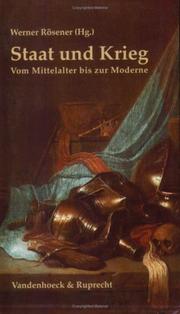| Listing 1 - 10 of 511 | << page >> |
Sort by
|
Book
ISBN: 9789589012574 9589012574 Year: 1991 Publisher: El áncora, Bogotá,
Abstract | Keywords | Export | Availability | Bookmark
 Loading...
Loading...Choose an application
- Reference Manager
- EndNote
- RefWorks (Direct export to RefWorks)
Book
ISBN: 2715412576 9782715412576 Year: 2022 Publisher: Paris: Que sais-je ? ,
Abstract | Keywords | Export | Availability | Bookmark
 Loading...
Loading...Choose an application
- Reference Manager
- EndNote
- RefWorks (Direct export to RefWorks)
Guerre "juste", guerre "totale", guerre "conventionnelle", "guérillas"… Si la guerre est une constante de l’histoire des hommes, elle n’en est pas moins en évolution perpétuelle. Aujourd’hui, alors que le nombre de conflits est en diminution, c’est pourtant le thème du « retour de la guerre » qui domine les débats. Et tandis que les armées occidentales ont recours à des moyens de très haute technologie, les modes les plus primitifs du combat restent en vigueur dans de nombreux pays en développement. Allant au-delà des idées reçues, Bruno Tertrais retrace les principales mutations de la guerre, examine les causes des conflits armés, en dresse le panorama contemporain. Il explicite les modes de régulation existants et s’interroge sur les formes de guerres à venir : y aura-t-il des "guerres de civilisation" ou des "guerres de ressources" ?
War --- Politics and war
Book
Year: 2012 Publisher: Podgorica : Centar za građansko obrazovanje (CGO),
Abstract | Keywords | Export | Availability | Bookmark
 Loading...
Loading...Choose an application
- Reference Manager
- EndNote
- RefWorks (Direct export to RefWorks)
Građani i građanke Crne Gore žele Evropu u svom gradu. Postavlja se pitanje, a što građani i građanke Crne Gore misle da je Evropa u njihovom gradu?.
Book
ISBN: 1554410991 Year: 2003 Publisher: Chicoutimi : J.-M. Tremblay,
Abstract | Keywords | Export | Availability | Bookmark
 Loading...
Loading...Choose an application
- Reference Manager
- EndNote
- RefWorks (Direct export to RefWorks)
War --- Politics and war. --- Causes.
Book
Year: 1963 Publisher: Paris: Librairie générale de droit et de jurisprudence,
Abstract | Keywords | Export | Availability | Bookmark
 Loading...
Loading...Choose an application
- Reference Manager
- EndNote
- RefWorks (Direct export to RefWorks)
Politics and war. --- France --- France

ISBN: 3525013868 Year: 2000 Publisher: Göttingen Vandenhoeck und Ruprecht
Abstract | Keywords | Export | Availability | Bookmark
 Loading...
Loading...Choose an application
- Reference Manager
- EndNote
- RefWorks (Direct export to RefWorks)
Politics and war --- War --- History
Book
ISBN: 9781909890749 9781909890756 9781909890732 Year: 2022 Publisher: London : LSE Press,
Abstract | Keywords | Export | Availability | Bookmark
 Loading...
Loading...Choose an application
- Reference Manager
- EndNote
- RefWorks (Direct export to RefWorks)
"Violence and war were ubiquitous features of politics long before the emergence of the modern state system. Since the late 18th century major revolutions across the world have further challenged the idea of the state as a final arbiter of international order. This book discusses ten major thinkers who have questioned and re-shaped how we think about politics, violence and relations between states – Thucydides, Augustine, Machiavelli, Hobbes, Locke, Rousseau, Clausewitz, Lenin and Mao, and Schmitt."
Book
ISBN: 0901832316 Year: 1987 Volume: 19 Publisher: Aberdeen University of Aberdeen . Department of geography
Abstract | Keywords | Export | Availability | Bookmark
 Loading...
Loading...Choose an application
- Reference Manager
- EndNote
- RefWorks (Direct export to RefWorks)
Military geography. --- Politics and war. --- Territory, National.
Book
ISBN: 9781631491603 Year: 2017 Publisher: New York : Liveright Publishing Corporation,
Abstract | Keywords | Export | Availability | Bookmark
 Loading...
Loading...Choose an application
- Reference Manager
- EndNote
- RefWorks (Direct export to RefWorks)
Is democracy dependent on war to survive ? Peace, many would agree, is a goal that democratic nations should strive to achieve. Considering the question of whether democracy is dependent on war, two celebrated political scientists trace the ways in which governments have mobilised armies since antiquity. They find that our modern form of democracy not only evolved in a brutally competitive environment but also was quickly excised when the powerful no longer needed their citizenry to defend against existential threats. Bringing to life many of the battles that shaped our world, the authors show how centralised monarchies replaced feudalism, why dictatorships can mobilise large forces but often fail at long-term military campaigns and how drone warfare has weakened democracy.
WAR --- DEMOCRACY --- POLITICS AND WAR --- MILITARY HISTORY
Book
Year: 1866 Publisher: Philadelphia J.B. Lippincott
Abstract | Keywords | Export | Availability | Bookmark
 Loading...
Loading...Choose an application
- Reference Manager
- EndNote
- RefWorks (Direct export to RefWorks)
| Listing 1 - 10 of 511 | << page >> |
Sort by
|

 Search
Search Feedback
Feedback About UniCat
About UniCat  Help
Help News
News